
Post Revolutionary War Era Documents and Speeches
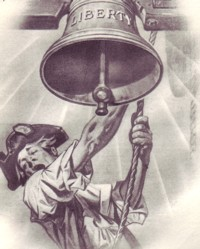
“It is the duty of every good citizen to use all the opportunities which occur to him, for preserving documents relating to the history of our country.”
— Thomas Jefferson
Post Revolutionary War Era Documents
William Henry Harrison - Inaugural Address - 1841
“The danger to all well-
The tendencies of all such governments in their decline is to monarchy, and the antagonist principle to liberty there is the spirit of faction-
–
Frédéric Bastiat - The Law - 1850
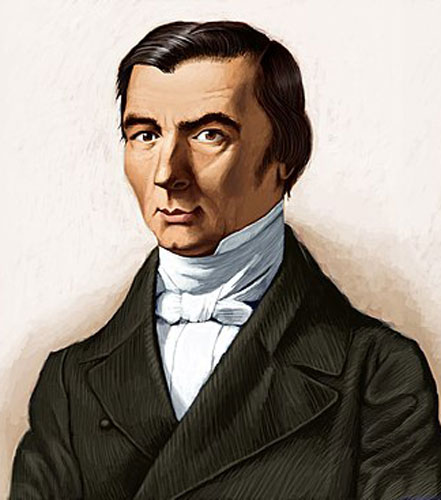
“What, then, is law? It is the collective organization of the individual right to lawful defense.
Each of us has a natural right — from God — to defend his person, his liberty, and his property. These are the three basic requirements of life, and the preservation of any one of them is completely dependent upon the preservation of the other two. For what are our faculties but the extension of our individuality? And what is property but an extension of our faculties? If every person has the right to defend even by force — his person, his liberty, and his property, then it follows that a group of men have the right to organize and support a common force to protect these rights constantly. Thus the principle of collective right — its reason for existing, its lawfulness — is based on individual right. And the common force that protects this collective right cannot logically have any other purpose or any other mission than that for which it acts as a substitute. Thus, since an individual cannot lawfully use force against the person, liberty, or property of another individual, then the common force — for the same reason — cannot lawfully be used to destroy the person, liberty, or property of individuals or groups.”
“What Is Liberty? Actually, what is the political struggle that we witness? It is the instinctive struggle of all people toward liberty. And what is this liberty, whose very name makes the heart beat faster and shakes the world? Is it not the union of all liberties — liberty of conscience, of education, of association, of the press, of travel, of labor, of trade? In short, is not liberty the freedom of every person to make full use of his faculties, so long as he does not harm other persons while doing so? Is not liberty the destruction of all despotism — including, of course, legal despotism? Finally, is not liberty the restricting of the law only to its rational sphere of organizing the right of the individual to lawful self-defense; of punishing injustice?”
– Frédéric Bastiat (1848-1850) French Economist, Politician, and Writer on Economics, Politics, and the Law.
Republican Party Platform - Founded July 6th 1854
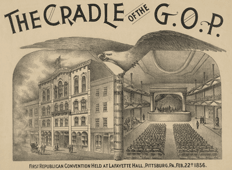
Resolved: That, with our Republican fathers, we hold it to be a self-
Resolved: That the Constitution confers upon Congress sovereign powers over the Territories of the United States for their government; and that in the exercise of this power, it is both the right and the imperative duty of Congress to prohibit in the Territories those twin relics of barbarism — Polygamy, and Slavery.
Resolved: That while the Constitution of the United States was ordained and established by the people, in order to “form a more perfect union, establish justice, insure domestic tranquility, provide for the common defense, promote the general welfare, and secure the blessings of liberty,” and contain ample provision for the protection of the life, liberty, and property of every citizen, the dearest Constitutional rights of the people of Kansas have been fraudulently and violently taken from them.
Napoleon Bonaparte - On the Divinity of Jesus Christ, exiled on Saint Helena - 1820

“I know men; and I tell you that Jesus Christ is not a man. Superficial minds see a resemblance between Christ and the founders of empires, and the gods of other religions. That resemblance does not exist. There is between Christianity and whatever other religions the distance of infinity…”
“The Bible is no mere book, but a Living Creature, with a power that conquers all that oppose it.”
“Time, the great destroyer, is powerless to extinguish this sacred flame; time can neither exhaust its strength nor put a limit to its range. This is it, which strikes me most; I have often thought of it. This it is which proves to me quite convincingly the Divinity of Jesus Christ.”
“If you do not perceive that Jesus Christ is God, very well, then I did wrong to make you a general.
Abraham Lincoln's Advice to the American People on the Constitution - 1837

“Let every American, every lover of liberty, every well-
Daniel Webster - Reception at Madison - 1837
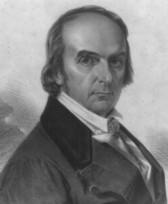
“On the diffusion of education among the people rest the preservation and perpetuation of our free institutions. I apprehend no danger to our country from a foreign foe. The prospect of a war with any powerful nation is too remote to be a matter of calculation. Besides, there is no nation on earth powerful enough to accomplish our overthrow. Our destruction, should it come at all, will be from another quarter. From the inattention of the people to the concerns of their government, from their carelessness and negligence, I must confess that I do apprehend some danger. I fear that they may place too implicit a confidence in their public servants, and fail properly to scrutinize their conduct; that in this way they may be made the dupes of designing men, and become the instruments of their own undoing. Make them intelligent, and they will be vigilant; give them the means of detecting the wrong, and they will apply the remedy. …
I regard it [Constitution] as the work of the purest patriots and wisest statesmen that ever existed, aided by the smiles of a benignant Providence for when we regard it as a system of government growing out of the discordant opinions and conflicting interests of thirteen independent States, it almost appears a Divine interposition in our behalf. … the hand that destroys the Constitution rends our Union asunder for ever.”
John Tyler - National Day of Fasting and Prayer - 1841

“When a Christian people feel themselves to be overtaken by a great public calamity, it becomes them to humble themselves under the dispensation of Divine Providence, to recognize His righteous government over the children of men, to acknowledge His goodness in time past, as well as their own unworthiness, and to supplicate His merciful protection for the future.
The death of William Henry Harrison, late President of the United States, so soon after his elevation to that high office, is a bereavement peculiarly calculated to be regarded as a heavy affliction and to impress all minds with a sense of the uncertainty of human things and of the dependence of nations, as well as individuals, upon our Heavenly Parent.”
William Seward - Higher Law Speach in the Senate - 1850

“It is true, indeed, that the national domain is ours. It is true it was acquired with the valor and with the wealth of the whole nation. But we hold, nevertheless, no arbitrary power over it. We hold no arbitrary authority over anything, whether acquired lawfully, or seized by usurpation. The constitution regulates our stewardship; the constitution devotes the domain to union, to justice, to defense, to welfare, and to liberty. But there is a higher law than the constitution, which regulates our authority over the domain, and devotes it to the same noble purposes. The territory is a part, no inconsiderable part, of the common heritage of mankind, bestowed upon them by the Creator of the universe. We are his stewards, and must so discharge our trust as to secure in the highest attainable degree their happiness.
Daniel Webster - The Dignity and Importance of History - 1853
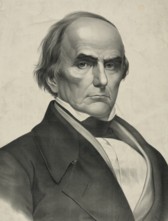
“Unborn ages and visions of glory crowd upon my soul, the realization of which, however, is in the hands and good pleasure of Almighty God, but, under His divine blessing, it will be dependent on the character and the virtues of ourselves and our posterity. ….And let me say, gentlemen, that if we and our posterity shall be true to the Christian religion, if we and they shall live always in the fear of God, and shall respect His commandments, if we and they shall maintain just moral sentiments and such conscientious convictions of duty as shall control the heart and life, we may have the highest hopes of the future fortunes of our country …. It will have no decline and fall. It will go on prospering and to prosper.
But if we and our posterity reject religious institutions and authority, violate the rules of eternal justice, trifile with the injunctions of morality, and recklessly destroy the political constitution which holds us together, no man can tell how sudden a catastrophe may overwhelm us that shall bury all our glory in profound obscurity. Should that catastrophe happen, let it have no history! Let the horrible narrative never be written! Let its fate be like that of the lost books of Livy, which no human eye shall ever read, or the missing Pleiad, of which no man can ever know more than that it is lost, and lost forever!”
Abraham Lincoln's First Inaugural Address - 1861

“Descending from these general principles, we find the proposition that in legal contemplation the Union is perpetual confirmed by the history of the Union itself. The Union is much older than the Constitution. It was formed, in fact, by the Articles of Association in 1774. It was matured and continued by the Declaration of Independence in 1776. It was further matured, and the faith of all the then thirteen States expressly plighted and engaged that it should be perpetual, by the Articles of Confederation in 1778. And finally, in 1787, one of the declared objects for ordaining and establishing the Constitution was ‘to form a more perfect Union.’ But if destruction of the Union by one or by a part only of the States be lawfully possible, the Union is less perfect than before the Constitution, having lost the vital element of perpetuity.”
The Emancipation Proclamation - 1863

That on the first day of January, in the year of our Lord one thousand eight hundred and sixty-
Now, therefore I, Abraham Lincoln, President of the United States, by virtue of the power in me vested as Commander-
And upon this act, sincerely believed to be an act of justice, warranted by the Constitution, upon military necessity, I invoke the considerate judgment of mankind, and the gracious favor of Almighty God.
Abraham Lincoln National Fast Day - 1863
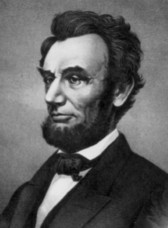
“And whereas it is the duty of nations as well as of men, to own their dependence upon the overruling power of God, to confess their sins and transgressions, in humble sorrow, yet with assured hope that genuine repentance will lead to mercy and pardon; and to recognize the sublime truth, announced in the Holy Scriptures and proven by all history, that those nations only are blessed whose God is the Lord.”
A Proclamation.
Whereas, the Senate of the United States, devoutly recognizing the Supreme Authority and just Government of Almighty God, in all the affairs of men and of nations, has, by a resolution, requested the President to designate and set apart a day for National prayer and humiliation.
Gettysburg Address - 1863

“Fourscore and seven years ago our fathers brought forth on this continent a new nation, conceived in liberty and dedicated to the proposition that all men are created equal. Now we are engaged in a great civil war, testing whether that nation or any nation so conceived and so dedicated can long endure. We are met on a great battlefield of that war. We have come to dedicate a portion of that field as a final resting-
Abraham Lincoln describing July 5th, 1863 — “Well, I will tell you how it was. In the pinch of the campaign up there (at Gettysburg) when everybody seemed panic-
Abraham Lincoln's Thanksgiving Proclamation - 1863

The ever watchful providence of Almighty God. … In the midst of a civil war of unequaled magnitude and severity, which has sometimes seemed to foreign States to invite and to provoke the aggression, peace has been preserved with all nations, order has been maintained, the laws have been respected and obeyed, and harmony has prevailed … They are the gracious gifts of the Most High God, who, while dealing with us in anger for our sins, hath nevertheless remembered mercy. It has seemed to me fit and proper that they should be solemnly, reverently and gratefully acknowledged as with one heart and one voice by the whole American People. …
I …set apart and observe the last Thursday of November next, as a day of Thanksgiving and Praise to our beneficent Father who dwelleth in the Heavens. And I recommend to them that while offering up the ascription’s justly due to Him for such singular deliverance’s and blessings, they do also, with humble penitence for our national perverseness and disobedience, commend to His tender care all those who have become widows, orphans, mourners or sufferers in the lamentable civil strife in which we are unavoidably engaged, and fervently implore the interposition of the Almighty hand to heal the wounds of the nation, and to restore it as soon as may be consistent with the Divine purposes to the full enjoyment of peace, harmony, tranquility, and Union.
Abraham Lincoln's Second Inaugural Address - 1865
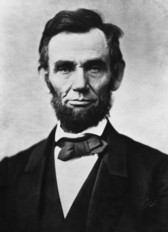
“Both read the same Bible and pray to the same God, and each invokes His aid against the other. It may seem strange that any men should dare to ask a just God’s assistance in wringing their bread from the sweat of other men’s faces, but let us judge not, that we be not judged. The prayers of both could not be answered. That of neither has been answered fully. The Almighty has His own purposes. ‘Woe unto the world because of offenses; for it must needs be that offenses come, but woe to that man by whom the offense cometh.’ … If we shall suppose that American slavery is one of those offenses which, in the providence of God, must needs come, but which, having continued through His appointed time, He now wills to remove, and that He gives to both North and South this terrible war …As was said three thousand years ago, so still it must be said ‘the judgments of the Lord are true and righteous altogether.'” Fellow-
Note: The Ku Klux Klan (KKK) was started after the Civil War by members of the Democratic party. (Young Men’s Democratic Club) Their goal was to terrorize and intimidate both black and white Republican voters to gain back political control.
THE UNITED STATES BECAME A FOREIGN CORPORATION - 1871
… The original Constitution drafted by the Founding Fathers, was written in this manner:
“The Constitution for the united states of America”.
The altered version reads: “THE CONSTITUTION OF THE UNITED STATES OF AMERICA”. It is the corporate constitution. It is NOT the same document you might think it is. The corporate constitution operates in an economic capacity and has been used to fool the People into thinking it is the same parchment that governs the Republic. It absolutely is not.
Capitalization — an insignificant change? Not when one is referring to the context of a legal document, it isn’t. Such minor alterations have had major impacts on each subsequent generation born in this country. What the Congress did with the passage of the Act of 1871 was create an entirely new document, a constitution for the government of the District of Columbia. The kind of government THEY created was a corporation. The new, altered Constitution serves as the constitution of the corporation, and not that of America. …
The date is February 21, 1871 and the Forty-First Congress is in session. I refer you to the “Acts of the Forty-First Congress,” Section 34, Session III, chapters 61 and 62. On this date in the history of our nation, Congress passed an Act titled: “An Act To Provide A Government for the District of Columbia.” This is also known as the “Act of 1871.” What does this mean? Well, it means that Congress, under no constitutional authority to do so, created a separate form of government for the District of Columbia, which is a ten mile square parcel of land. …
The Act of 1871 was passed at a vulnerable time in America. Our nation was essentially bankrupt — weakened and financially depleted in the aftermath of the Civil War. The Civil War itself was nothing more than a calculated “front” for some pretty fancy footwork by corporate backroom players. It was a strategic maneuver by European interests (the international bankers) who were intent upon gaining a stranglehold on the neck (and the coffers) of America.
The Congress realized our country was in dire financial straits, so they cut a deal with the international bankers …” (THE UNITED STATES BECAME A FOREIGN CORPORATION IN 1871, The Liberty Beacon)
Rev. S.W. Foljambe - The Hand of God in American History - 1876

The family is the sphere of affection and custom, the State is the sphere of justice; the family is the product of nature, but is evolved under the action and control of Providence, and the tendency of its history, both as to its limitations and powers, is to lead it to God, who exerises that providence, and is the source of that spirit of justice which is its root and life.
The more thoroughly a nation deals with its history, the decidedly will it recognize and own an overruling Providence therein, and the more religious a nation it will become; while the more superficially it deals with its history, seeing only secondary causes and human agencies, the more irreligious will it be. If the history of any nation is the development of the latent possibilities existing in its special nature, it is also the record of Divine Providence furnishing place and scope for that development, creating its opportunities and guiding its progress. History is not a string of striking episodes, with no other connection but that of time. It is rather the working out of a mighty system, by means of regularly defined principles as old as creation, and as infallible as divine wisdom. With this truth in view, we approach our chosen theme, The Hand of God in American History.
Not inappropriate do we deem it, that we trace along the line of our history how God was with our fathers, and recall and reaffirm in this presence the truth of our increasing dependence upon him for the continued prosperity of our country and people.
(1. Observe the hand of God in the wise and beneficent timing of events in the dawn of our history. The events of history are not accidents. There are no accidents in the lives of men or of nations. We may go back to the underlying cause of every event, and discover in each God’s overruling and intervening wisdom. It has been said that history is the biography of communities; in another, and profounder, sense, it is the autobiography of him “who worketh all things after the counsel of his own will,” and who is graciously timing all events in the interests of his Christ, and of the kingdom of God on earth. Tracing the history of men, we find the most trivial and seemingly fortuitous things issuing beyond all human expectation or intention in the sublimest events; we see men planning and working with only their own more immediate and material interests in view, and yet a power behind them is noiselessly and effectually, though possibly for generations unobserved, overruling their action to the furtherance of higher, more widely extended, and more permanent purposes. Human freedom and human responsibility in bringing about either good or evil, are not to be pushed aside; providence is not fatalism; but, on the other hand, man’s free activities do not prove the despotism of a blind chance, shifting as man’s caprice may dictate. Neither social order, moral progress, nor a Christian civilization, can spring out of chance. These demand a prevision and adjustment of causes keener and mightier than man with his wisest forethought and highest.
— Rev. S. W. Foljambe –
Albert J. Beveridge - “March of the Flag" - 1898

“It is a noble land that God has given us; a land that can feed and clothe the world; a land whose coastlines would inclose half the countries of Europe; a land set like a sentinel between the two imperial oceans of the globe, a greater England with a nobler destiny. …
It is a glorious history our God has bestowed upon His chosen people; a history heroic with faith in our mission and our future; a history of statesmen who flung the boundaries of the Republic out into unexplored lands and savage wilderness; a history of soldiers who carried the flag across blazing deserts and through the ranks of hostile mountains, even to the gates of sunset; a history of a multiplying people who overran a continent in half a century; a history of prophets who saw the consequences of evils inherited from the past and of martyrs who died to save us from them; a history divinely logical, in the process of whose tremendous reasoning we find ourselves today.
Wonderfully has God guided us Yonder at Bunker Hill and Yorktown. His providence was above us At New Orleans and on ensanguined seas His hand sustained u Abraham Lincoln was His minister and His was the altar of` freedom the Nation’s soldiers set up on a hundred battlefields. …The American people can not use a dishonest medium of` exchange; it is ours to set the world its example of` right and honor. We can not fly from our world duties; it is ours to execute the purpose of a fate that has driven us to be greater than our small intentions. We can not retreat from any soil where Providence has unfurled our banner; it is ours to save that soil for liberty and civilization.”
Theodore Roosevelt - "Social Values today in Europe, America and Australia" - 1916
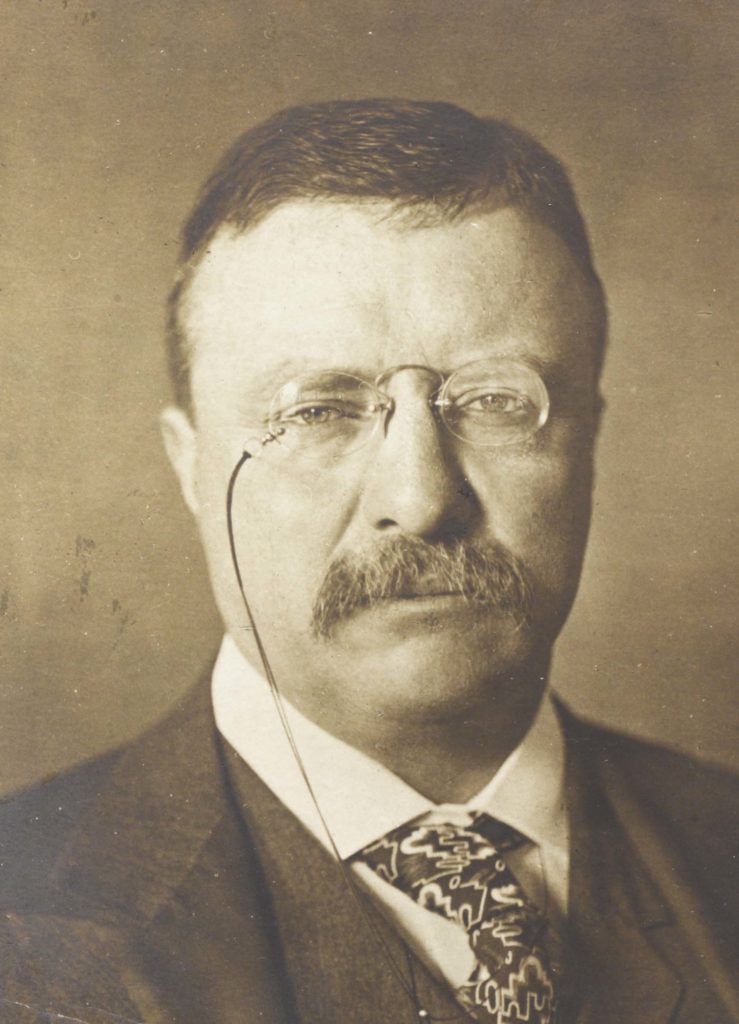
“The civilization of Europe, America, and Australia exists today at all only because of the victories of civilized man over the enemies of civilization … victories stretching through the centuries from Charles Martel in the 8th Century those Jan Sobieski in the 17th Century.
During the thousand years that included the careers of the Frankish soldiers and the Polish King, the Christians of Asia and Africa proved unable to wage successful war with the Moslem conquerors: and in consequence Christianity practically vanished from the two continents; and today nobody can find in them any ‘social values’ whatever … so far as the sphere of Mohammedan influences are concerned.
There are such ‘social values’ today in Europe, America and Australia only because … the Christians of Europe possessed the warlike power to do what the Christians of Asia and Africa had failed to do-
— Theodore Roosevelt (1901-
Learned Hand - "Spirit of Liberty" - 1944

“What do we mean when we say that first of all we seek liberty? I often wonder whether we do not rest our hopes too much upon constitutions, upon laws, and upon courts. These are false hopes; believe me, these are false hopes. Liberty lies in the hearts of men and women; when it dies there, no constitution, no law, no court can save it; no constitution, no law, no court can even do much to help it. While it lies there, it needs no constitution, no law, no court to save it. And what is this liberty which must lie in the hearts of men and women? It is not the ruthless, the unbridled will; it is not freedom to do as one likes. That is the denial of liberty, and leads straight to its overthrow. A society in which men recognize no check upon their freedom soon becomes a society where freedom is the possession of only a savage few –
— Learned Hand (1872–1961) United States District Court Judge
William O. Douglas - case of Zorach v. Clauson - 1952
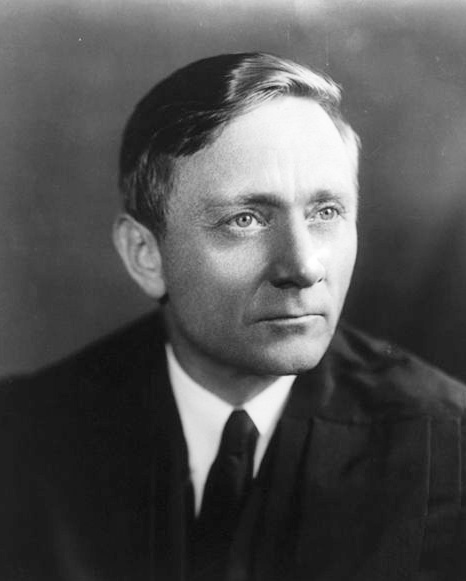
“The First Amendment within the scope of its coverage permits no exception; the prohibition is absolute. … Otherwise the state and religion would be aliens to each other –
We are a religious people whose institutions presuppose a Supreme Being. We guarantee the freedom to worship as one chooses. We make room for as wide a variety of beliefs and creeds as the spiritual needs of man deem necessary. We sponsor an attitude on the part of government that shows no partiality to any one group and that lets each flourish according to the zeal of its adherents and the appeal of its dogma. When the state encourages religious instruction or cooperates with religious authorities by adjusting the schedule of public events to sectarian needs, it follows the best of our traditions. For it then respects the religious nature of our people and accommodates the public service to their spiritual needs.”
— William Orville Douglas (1898–1980) Associate Justice of the Supreme Court of the United States
Herbert Hoover - Meaning of the Constitution and the Bill of Rights - 1935

Our Constitution is not alone the working plan of a great Federation of States under representative government. There is embedded in it also the vital principles of the American system of liberty. That system is based upon certain inalienable freedoms and protections which not even the government may infringe and which we call the Bill of Rights. It does not require a lawyer to interpret those provisions.
They are as clear as the Ten Commandments. Among others the freedom of worship, freedom of speech and of the press, the right of peaceable assembly, equality before the law, just trial for crime, freedom from unreasonable search, and security from being deprived of life, liberty, or property without due process of law, are the principles which distinguish our civilization. Herein are the invisible sentinels which guard the door of every home from invasion of coercion, of intimidation and fear. Herein is the expression of the spirit of men who would be forever free. …
In the hurricane of revolutions which have swept the world since the Great War, men, struggling with the wreckage and poverty of that great catastrophe and the complications of the machine age, are in despair surrendering their freedom for false promises of economic security. Whether it be Fascist Italy, Nazi Germany, Communist Russia, or their lesser followers, the result is the same. Every day they repudiate every principle of the Bill of Rights. Freedom of worship is denied. Freedom of speech is suppressed. The press is censored and distorted with propaganda. The right of criticism is denied. Men go to jail or the gallows for honest opinions. They may not assemble for discussion. They speak of public affairs only in whispers. They are subject to search and seizure by spies and inquisitors who haunt the land. The safeguards of justice in trial or imprisonment are set aside. There is no right in one’s savings or one’s own home which the government need respect. …
But it would be better that we sacrifice something of economic efficiency than to surrender these primary liberties. In them lies a spiritual right of men. Behind them is the conception which is the highest development of the Christian faith – the conception of individual freedom with brotherhood. From them is the fullest flowering of individual human personality.”
Winston Churchill - Blood, Toil, and Sweat - 1940

“And do not suppose that this is the end. This is only the beginning of the reckoning. This is only the first sip, the first foretaste of a bitter cup which will be proffered to us year by year, unless by a supreme recovery of moral health and martial vigor, arise and take our stand for freedom as in the olden time.”
“I am prepared to meet my Maker. Whether my Maker is prepared for the great ordeal of meeting me is another matter.”
“You can measure a man’s character by the choices he makes under pressure.”
“History will be kind to me for I intend to write it.”
“Today is Trinity Sunday. Centuries ago words were written to be a call and a spur to the faithful servants of Truth and Justice: Arm yourselves, and be ye men of valour, and be in readiness for the conflict; for it is better for us to perish in battle than to look upon the outrage of our nation and our altar. As the will of God is in Heaven, even so let it be.”
Winston Churchill - This was their finest hour - 194
General Eisenhower's message before the D-Day Invasion - June 6, 1944

“… The eyes of the world are upon you. The hopes and prayers of liberty loving people everywhere march with you. In company with our brave Allies and brothers in arms on other fronts, you will bring about the destruction of the German war machine, the elimination of Nazi tyranny over the oppressed peoples of Europe, and security for ourselves in a free world.
Your task will not be an easy one. Your enemy is well trained, well equipped and battle hardened, he will fight savagely. … Good Luck! And let us all beseech the blessings of Almighty God upon this great and noble undertaking.”
Franklin Delanor Roosevelt's D-Day Prayer - June 6, 1944

“Almighty God: our sons, pride of our Nation, this day have set upon a mighty endeavor, a struggle to preserve our Republic, our religion, and our civilization, and to set free a suffering humanity..”
John F. Kennedy - First Inaugural Address - January 20, 1961

“For I have sworn before you and Almighty God the same solemn oath our forbears prescribed nearly a century and three-
The world is very different now. For man holds in his mortal hands the power to abolish all forms of human poverty and all forms of human life. And yet the same revolutionary beliefs for which our forebears fought are still at issue around the globe-
We dare not forget today that we are the heirs of that first revolution. Let the word go forth from this time and place, to friend and foe alike, that the torch has been passed to a new generation of Americans-
Let every nation know, whether it wishes us well or ill, that we shall pay any price, bear any burden, meet any hardship, support any friend, oppose any foe to assure the survival and the success of liberty. …. With a good conscience our only sure reward, with history the final judge of our deeds, let us go forth to lead the land we love, asking His blessing and His help, but knowing that here on earth God’s work must truly be our own.”
John F. Kennedy - Secret Societies Speech - April 27, 1961
The very word “secrecy” is repugnant in a free and open society; and we are as a people inherently and historically opposed to secret societies, to secret oaths and to secret proceedings. We decided long ago that the dangers of excessive and unwarranted concealment of pertinent facts far outweighed the dangers, which are cited to justify it. Even today, there is little value in opposing the threat of a closed society by imitating its arbitrary restrictions. Even today, there is little value in insuring the survival of our nation if our traditions do not survive with it.
And there is very grave danger that an announced need for increased security will be seized upon by those anxious to expand its meaning to the very limits of official censorship and concealment. That I do not intend to permit to the extent that it is in my control. And no official of my Administration, whether his rank is high or low, civilian or military, should interpret my words here tonight as an excuse to censor the news, to stifle dissent, to cover up our mistakes or to withhold from the press and the public the facts they deserve to know.
But I do ask every publisher, every editor, and every newsman in the nation to reexamine his own standards, and to recognize the nature of our country’s peril. In time of war, the government and the press have customarily joined in an effort based largely on self-discipline, to prevent unauthorized disclosures to the enemy. In time of “clear and present danger,” the courts have held that even the privileged rights of the First Amendment must yield to the public’s need for national security.
Today no war has been declared–and however fierce the struggle may be, it may never be declared in the traditional fashion. Our way of life is under attack. Those who make themselves our enemy are advancing around the globe. The survival of our friends is in danger. And yet no war has been declared, no borders have been crossed by marching troops, no missiles have been fired.
If the press is awaiting a declaration of war before it imposes the self-discipline of combat conditions, then I can only say that no war ever posed a greater threat to our security. If you are awaiting a finding of “clear and present danger,” then I can only say that the danger has never been more clear and its presence has never been more imminent.
It requires a change in outlook, a change in tactics, a change in missions–by the government, by the people, by every businessman or labor leader, and by every newspaper. For we are opposed around the world by a monolithic and ruthless conspiracy that relies primarily on covert means for expanding its sphere of influence–on infiltration instead of invasion, on subversion instead of elections, on intimidation instead of free choice, on guerrillas by night instead of armies by day. It is a system which has conscripted vast human and material resources into the building of a tightly knit, highly efficient machine that combines military, diplomatic, intelligence, economic, scientific and political operations.
Its preparations are concealed, not published. Its mistakes are buried, not headlined. Its dissenters are silenced, not praised. No expenditure is questioned, no rumor is printed, no secret is revealed. It conducts the Cold War, in short, with a war-time discipline no democracy would ever hope or wish to match. Nevertheless, every democracy recognizes the necessary restraints of national security–and the question remains whether those restraints need to be more strictly observed if we are to oppose this kind of attack as well as outright invasion.
For the facts of the matter are that this nation’s foes have openly boasted of acquiring through our newspapers information they would otherwise hire agents to acquire through theft, bribery or espionage; that details of this nation’s covert preparations to counter the enemy’s covert operations have been available to every newspaper reader, friend and foe alike; that the size, the strength, the location and the nature of our forces and weapons, and our plans and strategy for their use, have all been pinpointed in the press and other news media to a degree sufficient to satisfy any foreign power; and that, in at least in one case, the publication of details concerning a secret mechanism whereby satellites were followed required its alteration at the expense of considerable time and money.
The newspapers which printed these stories were loyal, patriotic, responsible and well-meaning. Had we been engaged in open warfare, they undoubtedly would not have published such items. But in the absence of open warfare, they recognized only the tests of journalism and not the tests of national security. And my question tonight is whether additional tests should not now be adopted.
The question is for you alone to answer. No public official should answer it for you. No governmental plan should impose its restraints against your will. But I would be failing in my duty to the nation, in considering all of the responsibilities that we now bear and all of the means at hand to meet those responsibilities, if I did not commend this problem to your attention, and urge its thoughtful consideration.
On many earlier occasions, I have said–and your newspapers have constantly said–that these are times that appeal to every citizen’s sense of sacrifice and self-discipline. They call out to every citizen to weigh his rights and comforts against his obligations to the common good. I cannot now believe that those citizens who serve in the newspaper business consider themselves exempt from that appeal.
I have no intention of establishing a new Office of War Information to govern the flow of news. I am not suggesting any new forms of censorship or any new types of security classifications. I have no easy answer to the dilemma that I have posed, and would not seek to impose it if I had one. But I am asking the members of the newspaper profession and the industry in this country to reexamine their own responsibilities, to consider the degree and the nature of the present danger, and to heed the duty of self-restraint which that danger imposes upon us all.
Every newspaper now asks itself, with respect to every story: “Is it news?” All I suggest is that you add the question: “Is it in the interest of the national security?” And I hope that every group in America–unions and businessmen and public officials at every level– will ask the same question of their endeavors, and subject their actions to the same exacting tests.
And should the press of America consider and recommend the voluntary assumption of specific new steps or machinery, I can assure you that we will cooperate whole-heartedly with those recommendations.
Perhaps there will be no recommendations. Perhaps there is no answer to the dilemma faced by a free and open society in a cold and secret war. In times of peace, any discussion of this subject, and any action that results, are both painful and without precedent. But this is a time of peace and peril which knows no precedent in history.
It is the unprecedented nature of this challenge that also gives rise to your second obligation–an obligation which I share. And that is our obligation to inform and alert the American people–to make certain that they possess all the facts that they need, and understand them as well–the perils, the prospects, the purposes of our program and the choices that we face.
No President should fear public scrutiny of his program. For from that scrutiny comes understanding; and from that understanding comes support or opposition. And both are necessary. I am not asking your newspapers to support the Administration, but I am asking your help in the tremendous task of informing and alerting the American people. For I have complete confidence in the response and dedication of our citizens whenever they are fully informed.
I not only could not stifle controversy among your readers–I welcome it. This Administration intends to be candid about its errors; for as a wise man once said: “An error does not become a mistake until you refuse to correct it.” We intend to accept full responsibility for our errors; and we expect you to point them out when we miss them.
Without debate, without criticism, no Administration and no country can succeed–and no republic can survive. That is why the Athenian lawmaker Solon decreed it a crime for any citizen to shrink from controversy. And that is why our press was protected by the First Amendment– the only business in America specifically protected by the Constitution- -not primarily to amuse and entertain, not to emphasize the trivial and the sentimental, not to simply “give the public what it wants”–but to inform, to arouse, to reflect, to state our dangers and our opportunities, to indicate our crises and our choices, to lead, mold, educate and sometimes even anger public opinion.
This means greater coverage and analysis of international news–for it is no longer far away and foreign but close at hand and local. It means greater attention to improved understanding of the news as well as improved transmission. And it means, finally, that government at all levels, must meet its obligation to provide you with the fullest possible information outside the narrowest limits of national security–and we intend to do it.
It was early in the Seventeenth Century that Francis Bacon remarked on three recent inventions already transforming the world: the compass, gunpowder and the printing press. Now the links between the nations first forged by the compass have made us all citizens of the world, the hopes and threats of one becoming the hopes and threats of us all. In that one world’s efforts to live together, the evolution of gunpowder to its ultimate limit has warned mankind of the terrible consequences of failure.
And so it is to the printing press–to the recorder of man’s deeds, the keeper of his conscience, the courier of his news–that we look for strength and assistance, confident that with your help man will be what he was born to be: free and independent.
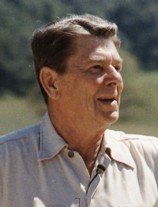
“Well I think it’s time we ask ourselves if we still know the freedoms that were intended for us by the Founding Fathers. … If we lose freedom here, there’s no place to escape to. This is the last stand on earth.
And this idea that government is beholden to the people, that it has no other source of power except the sovereign people, is still the newest and the most unique idea in all the long history of man’s relation to man. …Well, perhaps there is a simple answer—not an easy answer—but simple: If you and I have the courage to tell our elected officials that we want our national policy based on what we know in our hearts is morally right. …
You and I have a rendezvous with destiny. We’ll preserve for our children this, the last best hope of man on earth, or we’ll sentence them to take the last step into a thousand years of darkness.”
Ronald Reagan - Public Law 97-280 - October 4, 1982
Joint Resolution authorizing and requesting the President to proclaim 1983 as the “Year of the Bible.”
Whereas the Bible, the Word of God, has made a unique contribution in shaping the United States as a distinctive and blessed nation and people;
Whereas deeply held religious convictions springing from the Holy Scriptures led to the early settlement of our Nation;
Whereas Biblical teachings inspired concepts of civil government that are contained in our Declaration of Independence and the constitution of the United States;
Whereas many of our great national leaders—among them Presidents Washington, Jackson, Lincoln, and Wilson—paid tribute to the surpassing influence of the Bible in our country’s development, as the words of President Jackson that the Bible is “the rock on which our Republic rests”;
Whereas the history of our Nation clearly illustrates the value of voluntarily applying the teachings of the Scriptures in the lives of individuals, families, and societies;
Whereas this Nation now faces great challenges that will test this Nation as it has never been tested before; and
Whereas that renewing our knowledge of and faith in God through Holy Scripture can strengthen us as a nation and a people: Now, therefore, be it
Resolved by the Senate and House of Representatives of the United States of America in Congress assembled , That the President is authorized and requested to designate 1983 as a national “Year of the Bible” in recognition of both the formative influence the Bible has been for our Nation, and our national need to study and apply the teachings of the Holy Scriptures.
Approved October 4, 1982. Passed by the President
1 U.S. Cong. & Adm. News ’82-29 96 Stat. 1211
Ronald Reagan's Evil Empire Speech - March 8, 1983

“Yes, let us pray for the salvation of all of those who live in that totalitarian darkness — pray they will discover the joy of knowing God. But until they do, let us be aware that while they preach the supremacy of the state, declare its omnipotence over individual man, and predict its eventual domination of all peoples on the Earth, they are the focus of evil in the modern world. …So, I urge you to speak out against those who would place the United States in a position of military and moral inferiority. …So, in your discussions of the nuclear freeze proposals, I urge you to beware the temptation of pride — the temptation of blithely declaring yourselves above it all and label both sides equally at fault, to ignore the facts of history and the aggressive impulses of an evil empire, to simply call the arms race a giant misunderstanding and thereby remove yourself from the struggle between right and wrong and good and evil.”
“He called us the ‘Evil Empire.’ So why did you in the West laugh at him? It’s true!”
— Arkady Murashev, Moscow police chief, a leader of Democratic Russia
Editors Note: Reagan’s anticommunist work with John Paul II, the “Holy Alliance,” would be tied to a series of messages given to three illiterate children in Fatima, Portugal in 1917, by an apparition of the Virgin Mary. The messages were given to the children at the end of WWI, years before Russia was a country.
Alexander Solzhenitsyn - Men have Forgotten God - May 10, 1983
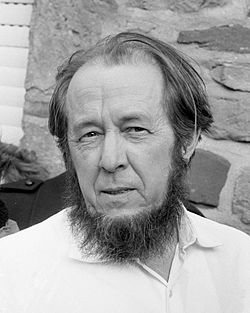
“More than half a century ago, while I was still a child, I recall hearing a number of older people offer the following explanation for the great disasters that had befallen Russia: Men have forgotten God; that’s why all this has happened. …
But the world had never before known a godlessness as organized, militarized, and tenaciously malevolent as that practiced by Marxism. Within the philosophical system of Marx and Lenin, and at the heart of their psychology, hatred of God is the principal driving force, more fundamental than all their political and economic pretensions. Militant atheism is not merely incidental or marginal to Communist policy; it is not a side effect, but the central pivot… while the children were turned from the faith by threats and lies…
…. The concepts of good and evil have been ridiculed for several centuries; banished from common use, they have been replaced by political or class considerations of short lived value. It has become embarrassing to state that evil makes its home in the individual human heart before it enters a political system. Yet it is not considered shameful to make dally concessions to an integral evil. Judging by the continuing landslide of concessions made before the eyes of our very own generation, the West is ineluctably slipping toward the abyss. Western societies are losing more and more of their religious essence as they thoughtlessly yield up their younger generation to atheism. …
Or why should one refrain from burning hatred, whatever its basis-
The social theories that promised so much have demonstrated their bankruptcy, leaving us at a dead end. The free people of the West could reasonably have been expected to realize that they are beset · by numerous freely nurtured falsehoods, and not to allow lies to be foisted upon them so easily. …If we perish and lose this world, the fault will be ours alone.”
Ronald Reagan's Speech to members of the British Parliament - June 8, 1982
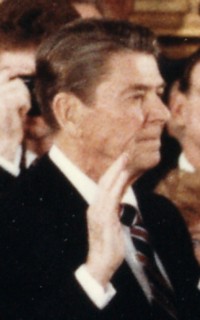
Historians looking back at our time will note the consistent restraint and peaceful intentions of the West. They will note that it was the democracies who refused to use the threat of their nuclear monopoly in the forties and early fifties for territorial or imperial gain. Had that nuclear monopoly been in the hands of the Communist world, the map of Europe –
If history teaches anything it teaches self-
Ronald Reagan's Farewell Address - January 11, 1989
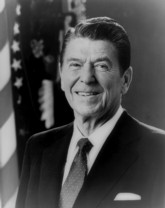
There’s a clear cause and effect here that is as neat and predictable as a law of physics: As government expands, liberty contracts. …Ours was the first revolution in the history of mankind that truly reversed the course of government, and with three little words: “We the people.” “We the people” tell the government what to do, it doesn’t tell us. “We the people” are the driver, the government is the car. And we decide where it should go, and by what route, and how fast. Almost all the world’s constitutions are documents in which governments tell the people what their privileges are. Our Constitution is a document in which “We the people” tell the government what it is allowed to do. “We the people” are free. This belief has been the underlying basis for everything I’ve tried to do these past eight years. …
we’re about to enter the ’90s, and some things have changed. Younger parents aren’t sure that an unambivalent appreciation of America is the right thing to teach modern children. And as for those who create the popular culture, well-